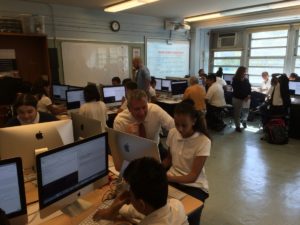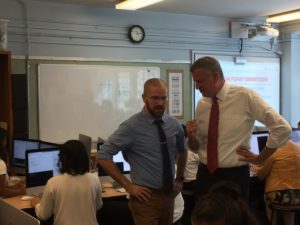On Thursday Sept. 22 in a sunny second floor classroom at the Laboratory School of Finance and Technology in Mott Haven, eighth grade students in Ben Samuel-Kalow’s computer programming class saw a pop quiz on the screens of their Mac computers. New York Mayor Bill de Blasio, sitting among them, said he saw a glimpse of the future of New York City education, a future he hopes is now one step closer to becoming a reality.
Accompanied by Schools Chancellor Carmen Farina and a collection of public and private sector supporters, de Blasio announced $20 million in new private sector funding for his plan to bring computer science to every public school in New York City. The city will chip in $40 million of its own, the mayor said, out of the total $80 million required to reach every school by 2025.

Mayor Bill de Blasio pairs up with eighth-grader Amiah for a coding exercise. Photo by Mike Elsen-Rooney
The Laboratory School, which is offering Advanced Placement Computer Science for the first time this year, represents de Blasio’s contention that the initiative will most directly benefit schools serving low-income black and Latino students.
“Let’s face it,” the mayor said, “it was a norm that computer science education was in many ways considered an elite activity.”
This year, 246 schools out of the roughly 1,700 in the city have begun offering computer programming, de Blasio said, and the city has trained 450 teachers to instruct those courses. The city will eventually need 5,000 computer science teachers.
City officials said they hope students will not the only beneficiaries of the program.
“Our employers are starved for talent,” said Gabriella Fialkoff, Director of the mayor’s office of partnerships, “and we all know that talent is one thing we have plenty of in this city.”
She said that by training public school students in programming, the New York technology industry will eventually be able to count on qualified local workers from diverse backgrounds. Technology companies have been under fire for disproportionately employing white men.
Venture Capitalist Fred Wilson, who has led the effort to secure private sector funding, laid out the role of computer science classes in even starker terms. “If you do not know how to tell a machine what to do” in the 21st century, Wilson said, “you will be a second class citizen.”

De Blasio chats with computer programming teacher Ben Samuels-Kalow during his lesson. Photo by Mike Elsen-Rooney
As the initiative continues to roll out, schools will have substantial freedom in how specifically to satisfy the requirement of offering computer science instruction. Some schools, Wilson imagined, would offer a full, four-year sequence and become known as places to go for students deeply interested in the subject. Other schools will offer programming as part of existing courses.
Farina said she is not worried that the expansion of computer science will displace other subjects like the fine arts.
“To me it is all about blended learning,” she said. “And it is not an add-on. It’s actually tied in to everything else that they are doing, but also, getting them ready for the next step.”
At the Laboratory School, where a substantial population of students are homeless or do not have dependable access to computers at home, programming classes have offered both obstacles and opportunities. Samuels-Kalow has structured his course around not assigning homework. “That wouldn’t be equitable,” he said, since many students lack a computer, reliable Wi-Fi or even a quiet place to work at home.
Samuels-Kalow’s solution has been to keep computers open and accessible to his students after school, so that those eager to spend more time coding have the opportunity. One of his students, ninth-grader Yaritza, has been a regular at those after school sessions. She said she has never felt a conflict with keeping computer science in her schedule and taking other classes that interested her.
Another student, Amiah, got a taste of both the academic and career benefits of programming when she led de Blasio through an exercise in the Python coding language. After the eighth-grader explained her process to the mayor, de Blasio handed her a business card – in case she is ever looking for an internship.
